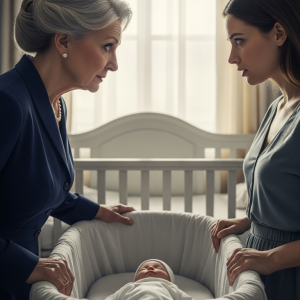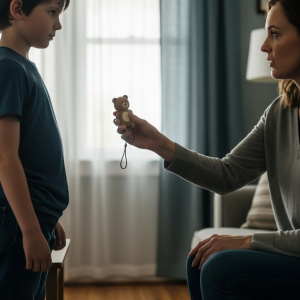The conference room at Sterling, Bosch & Covington was a silent, opulent tomb. Sunlight, thick with the dust of old money, streamed through the floor-to-ceiling windows, illuminating the strained faces of the assembled Sterling family. They had come to hear the final will and testament of the family matriarch, Eleanor Sterling.
At the head of the massive mahogany table sat Mark Sterling, Eleanor’s grandson. He was the golden boy, the chosen one, and he wore his status like a tailored suit. He accepted the hushed condolences of his aunts and uncles with a somber nod, but his eyes glittered with an ill-concealed avarice. He was not here to mourn a grandmother; he was here to claim a kingdom.
In a forgotten chair against the far wall sat Anna, his cousin. While Mark had graced Eleanor’s life with his presence on holidays and for carefully staged social media posts, Anna had been a quiet, constant fixture. She was the one who had brought Eleanor groceries, who had sat with her for hours listening to stories, and who had held her hand in the sterile quiet of the hospital room during the final days. The rest of the family treated her with a polite indifference, seeing her as little more than a helpful, unglamorous accessory to the family’s grand tapestry.
Mark caught her eye and gave a small, condescending smirk. He saw her not as a rival—that would require him to see her as an equal—but as a piece of furniture, a drab footnote in the grand story of his inheritance. He was about to become the head of the Sterling family, and Anna would be lucky to be left a sentimental trinket.
Anna’s mind drifted away from the stuffy room, back to a gray afternoon two months ago. The scent of lavender and old paper had filled Eleanor’s sunroom. Her grandmother, frail but with an undiminished fire in her eyes, had tapped a finger on a battered, floral-patterned recipe box on the table beside her.
“They all see an old woman,” Eleanor had said, her voice a raspy whisper. “But you, Anna, you have my eyes. You see things for what they are, not just what they appear to be.”
Anna had been helping her sort through old photographs. Mark had called earlier, a five-minute, perfunctory check-in from a ski lift in Aspen. Meanwhile, Anna had been there all day, listening to Eleanor’s stories—not just of family, but of shrewd business deals from the 1960s, of buying up “useless” tracts of land in a forgotten industrial sector of the city.
Eleanor had gestured to the recipe box. “Mark thinks my greatest assets are in a stock portfolio. He’s a fool. He sees a mansion, but he doesn’t see the mortgages. He sees a brand, but he doesn’t see the debts.” She had looked at Anna then, her gaze sharp and penetrating. “Everything of real value in my life, everything that will truly last, is in this box.”
Anna had assumed she meant the recipes themselves, the handwritten cards stained with the fingerprints of generations, a legacy of love and family meals. A legacy of the heart.
“Never judge a person by their title, or a piece of land by the weeds growing on it,” Eleanor had whispered, her grip surprisingly strong on Anna’s hand. “Remember that.” It had felt like a final lesson, a piece of grandmotherly wisdom. Anna hadn’t realized at the time that it was actually a key.
The lawyer, a stern man named Mr. Covington, cleared his throat, the sound echoing in the tense silence. He broke the seal on a thick envelope and began to read the will. His voice was a dry, emotionless drone, listing bequests of art and jewelry to various relatives.
Then he arrived at the main event.
“To my grandson, Mark Sterling,” he read, “in recognition of his position as the future of our family name, I bequeath the primary Sterling residence located in Beverly Hills, California.”
A low murmur of approval went through the room. Mark sat up straighter, the smirk returning to his face.
“Furthermore,” the lawyer continued, “I bequeath to my grandson, Mark, the entirety of my stock portfolio, managed by Sterling Investments, and the full balance of all my personal and savings accounts.”
It was a clean sweep. The kingdom had been officially transferred. Mark leaned back in his chair, the picture of triumph. He shot a look at Anna, a look of pity so profound it was almost comical. He had won. She was nothing.
Mr. Covington adjusted his glasses. “And finally…” he said, his voice dropping slightly.
“…and to my beloved granddaughter, Anna Sterling, who gave me the invaluable gifts of her time, her patience, and her love, I leave my most cherished personal possession: my old recipe box.”
The silence was broken by a sharp, barking laugh. It was Mark. He didn’t even try to stifle it. “A recipe box!” he exclaimed, loud enough for the whole room to hear. “How perfect! Grandma always knew exactly what everyone was worth.”
A few of his sycophantic relatives joined in with quiet, cruel snickers. Anna felt her face flush, but she held her head high. The humiliation was a physical thing, a hot wave of shame. But beneath it, her grandmother’s words echoed in her mind: Never judge a thing by its appearance.
Anna stood and walked to the front of the room with a quiet dignity that seemed to unnerve her tormentors. Mr. Covington handed her the familiar, battered tin box. It felt heavier than she remembered.
She returned to her seat, placed the box on her lap, and lifted the lid. On top lay the familiar, age-stained recipe cards for her grandmother’s famous apple pie and pot roast. Mark was still chuckling to himself.
But then, as the rest of the family began to stir, ready to leave, Mr. Covington held up a hand. “Please, ladies and gentlemen, there is one final addendum to the will, which I am instructed to read now.”
All eyes turned back to him. He looked directly at Anna.
“The addendum reads as follows,” he announced, his voice suddenly taking on a new, authoritative weight. “The aforementioned recipe box, bequeathed to my granddaughter, Anna, also serves as the legal repository for all founding documents, deeds, and certificates of ownership for the private entity known as ‘The Eleanor Sterling Real Estate Trust.'”
The room went utterly still. Mark’s smile vanished, replaced by a flicker of confusion. He knew about that trust. It was a legal structure his grandmother had set up years ago for “tax purposes,” holding a few of her old, dilapidated commercial properties. He had always dismissed it as a pittance.
The lawyer continued, his voice now booming in the silent room. “Per the terms of the trust, which supersedes all other testamentary documents, I am instructed to announce that upon my passing, the sole trustee, chairwoman, and exclusive beneficiary of The Eleanor Sterling Real Estate Trust, with full and unilateral control over all its assets, is to be Ms. Anna Sterling.”
Anna looked down into the box. Beneath the recipe cards lay a thick, leather-bound portfolio. She lifted it out. It was filled with official deeds, titles, and the trust’s charter, all bearing her grandmother’s elegant signature and, now, her own name.
Mark stared, his face a mask of disbelief. “The old warehouses?” he stammered, his voice suddenly sounding thin and reedy. “That’s just a few rundown buildings. It’s nothing.”
Mr. Covington looked at Mark with something that resembled pity. “On the contrary,” he said. “Your grandmother was a very astute businesswoman. The ‘rundown buildings’ you speak of comprise twelve contiguous commercial lots in what is now officially the city’s new technology and development district. A recent independent appraisal, commissioned for the trust, valued those holdings, which are owned free and clear of all debt, at approximately ninety million dollars.”
A collective gasp went through the room. Ninety million. The number hung in the air, a figure so vast it was almost comical.
Mark looked as if he had been physically struck. His face was pale, his mouth hanging open. The relatives who had been snickering moments before were now staring at Anna, their expressions a mixture of shock, awe, and newfound, fawning respect. The power in the room had just shifted with the force of an earthquake.
“And there is one final matter,” Mr. Covington said, turning the page as if delivering a final, fatal blow. “Regarding the assets bequeathed to you, Mr. Sterling. After settling the outstanding second mortgage on the Beverly Hills property and the extensive medical debts from Mrs. Sterling’s final years of care—which, per her instructions, are to be paid from the accounts you inherited—we project the net value of your inheritance to be, for all intents and purposes, zero.”
It was a checkmate delivered from beyond the grave. Mark had been given a hollow crown, a bankrupt kingdom. And Anna, the quiet, overlooked girl in the corner, had just been handed the keys to the entire empire.
The days that followed were a blur of legal meetings for Anna and a slow-motion nightmare for Mark. He sat in the grand, empty library of the Beverly Hills mansion he had inherited, the foreclosure notices and medical bills piling up on the desk in front of him. The staff had been let go. The glamour had evaporated, leaving only the smell of decay and debt.
He was a king in a hollow castle. His friends, who had been so eager to celebrate his inheritance, were suddenly distant. He was no longer Mark Sterling, the golden heir. He was a cautionary tale, a laughingstock. He had been so focused on the glittering surface of his grandmother’s life that he had never bothered to look at the foundations. And his grandmother, the woman he thought adored him, had seen his superficiality, his greed, and had delivered the most profound, public, and financially devastating rebuke imaginable.
He had been weighed, measured, and in the end, he had been found wanting.
Two years later, the once-derelict warehouse district was unrecognizable. It was now a bustling, vibrant hub of innovation and commerce, filled with gleaming glass-and-steel buildings, thriving restaurants, and green, open spaces. A large, elegant sign at the entrance to the main plaza read: THE ELEANOR STERLING CENTER.
Anna stood on a balcony overlooking the plaza, not in a power suit, but in simple jeans and a sweater. She wasn’t a corporate titan. She was a custodian, a builder. She had not sold the land for a quick profit. Instead, she had meticulously executed her grandmother’s vision, partnering with developers who shared her commitment to sustainable and community-focused growth.
She had become the head of the family, not through birthright, but through character. The wealth she now controlled was a tool, not a status symbol. She had established the Eleanor Sterling Scholarship Fund for young women entering business and was a major benefactor for the city’s historical preservation society.
She took out her phone and looked at a photo of her and Eleanor, taken in the sunroom that last day. She finally understood. Her grandmother hadn’t left her money. She had left her a responsibility. She had left her a test, a test of character that Mark had spectacularly failed and that Anna was now passing with quiet, humble grace.
She looked down at the thriving community she had helped build, a legacy of substance, not of style. The recipe box sat on her desk at home, but she no longer needed it to remember her grandmother’s greatest lesson. She was living it. True value was never in the glittering facade, but in the solid, unshakeable foundation beneath.
The boardroom was a symphony of glass and steel, overlooking the sprawling construction site that was rapidly transforming into the Eleanor Sterling Center. Anna sat at the head of the table, a position that still felt both foreign and strangely natural. Seated around her were architects, city planners, and a team of developers, all men in expensive suits who had, in their first meeting, clearly underestimated her.
They were reviewing the final plans for the central plaza, the heart of the entire development. One of the lead developers, a slick man named Peterson, pointed to a large green space on the blueprint.
“Ms. Sterling,” he began, his voice smooth and persuasive, “we’ve run the numbers. If we reduce the public park space by just thirty percent, we can accommodate a second luxury retail pavilion. The profit margin would increase by an estimated eighteen percent. It’s a significant opportunity.”
The old Anna would have been intimidated, overwhelmed by the jargon and the confident authority in his voice. But the woman who had sat by her grandmother’s side for years, listening to stories of deals won and lost on matters of principle, was not so easily swayed.
She looked not at Peterson, but at the architectural rendering of the park. She saw children playing, office workers eating lunch in the sun, a community gathering space. This was the part of the project Eleanor had been most passionate about in her private journals.
“No,” Anna said, her voice quiet but carrying an undeniable weight of finality that silenced the room. “The park remains exactly as designed. My grandmother believed that a community’s value isn’t measured in profit margins, but in its quality of life. The Eleanor Sterling Center will not be a monument to greed. It will be a testament to her vision.”
Peterson started to protest, but she held up a hand. “The decision is not open for discussion. We are building a legacy here, gentlemen. Not just a shopping mall.”
The men around the table exchanged looks. The message was clear. The quiet, overlooked girl was gone. In her place sat the true heir of Eleanor Sterling, a woman who understood that real power wasn’t about accumulating wealth, but about how you chose to wield it.
The auction room was cold and impersonal. Mark sat in the back row, a ghost at his own funeral. On the block were the last vestiges of his former life: the Italian marble statues from the mansion’s foyer, the Persian rugs, the 18th-century grandfather clock that had chimed every hour of his privileged childhood.
He was a spectator to the dismantling of his own history, each slam of the auctioneer’s gavel a fresh nail in the coffin of his identity. The proceeds would barely cover the last of the debts his grandmother had so cleverly saddled him with. The life he had been promised, the life he had felt so entitled to, had been a mirage.
He saw a few familiar faces in the crowd—former friends of the family, business associates. They did not meet his eye. He was a pariah, a living embodiment of failure. His spectacular fall from grace had become a delicious piece of gossip in the circles he once dominated.
The auctioneer announced the next lot: a collection of antique silver. Mark remembered polishing that silver with his grandmother as a boy, a tedious chore he had always complained about. He had never once asked her where it came from, or what stories it held. He had only seen its monetary value.
A sudden, sickening wave of clarity washed over him. He had spent his entire life looking at his grandmother as a vault, a treasure chest whose contents he was destined to inherit. He had never truly seen her. He had never cared about her stories, her passions, her history. He had only cared about the bottom line.
Anna, on the other hand, had sat and listened. She had learned. He had seen the recipe box as a joke, an insult. He realized now that it had been a final, brilliant test. A test of character, of perception, of love. And he had failed it so completely, so publicly, that it had undone his entire world. He finally understood. His grandmother hadn’t just disinherited him. She had shown him, in the cruelest and most undeniable way, exactly why he had never been worthy of the inheritance in the first place.
The autumn evening light filled Anna’s small but comfortable kitchen. The scent of cinnamon, apples, and baking pastry was a warm, comforting hug. On the counter, propped open, was the battered, floral-patterned recipe box.
She was making Eleanor’s famous apple pie, the handwritten recipe card stained and soft from decades of use. She ran her finger over her grandmother’s elegant, looping script. This felt more real, more valuable, than any of the multi-million dollar contracts she had signed that week.
Since the day of the will reading, her life had been a whirlwind of lawyers, architects, and financial advisors. She had been forced to learn, to adapt, to become the leader her grandmother had known she could be. The respect she now commanded from her family and the business world was something she had never sought, but she wore it with a quiet, steady confidence.
She looked from the recipe card to the blueprints for a new community library, which were spread across her kitchen table. It was the latest addition to the Eleanor Sterling Center. She smiled. She was still following her grandmother’s recipes. One was for a pie, a simple act of nourishment and love. The other was for a community, a complex act of vision and care. But the ingredients, she realized, were the same.
Her grandmother had left her two fortunes, both contained within that single, humble box. One was a legacy of wealth, built on shrewdness and foresight. The other was a legacy of values, built on love, humility, and the simple wisdom of knowing what truly nourishes the human spirit. Mark had only been able to see the first, and in his greed, had lost it all. Anna understood that the second legacy was the key to managing the first.
She slid the pie into the oven and leaned against the counter, a sense of profound peace settling over her. She was not just the keeper of her grandmother’s fortune. She was the keeper of her grandmother’s heart. And that was an inheritance that could never be measured, mortgaged, or sold.




